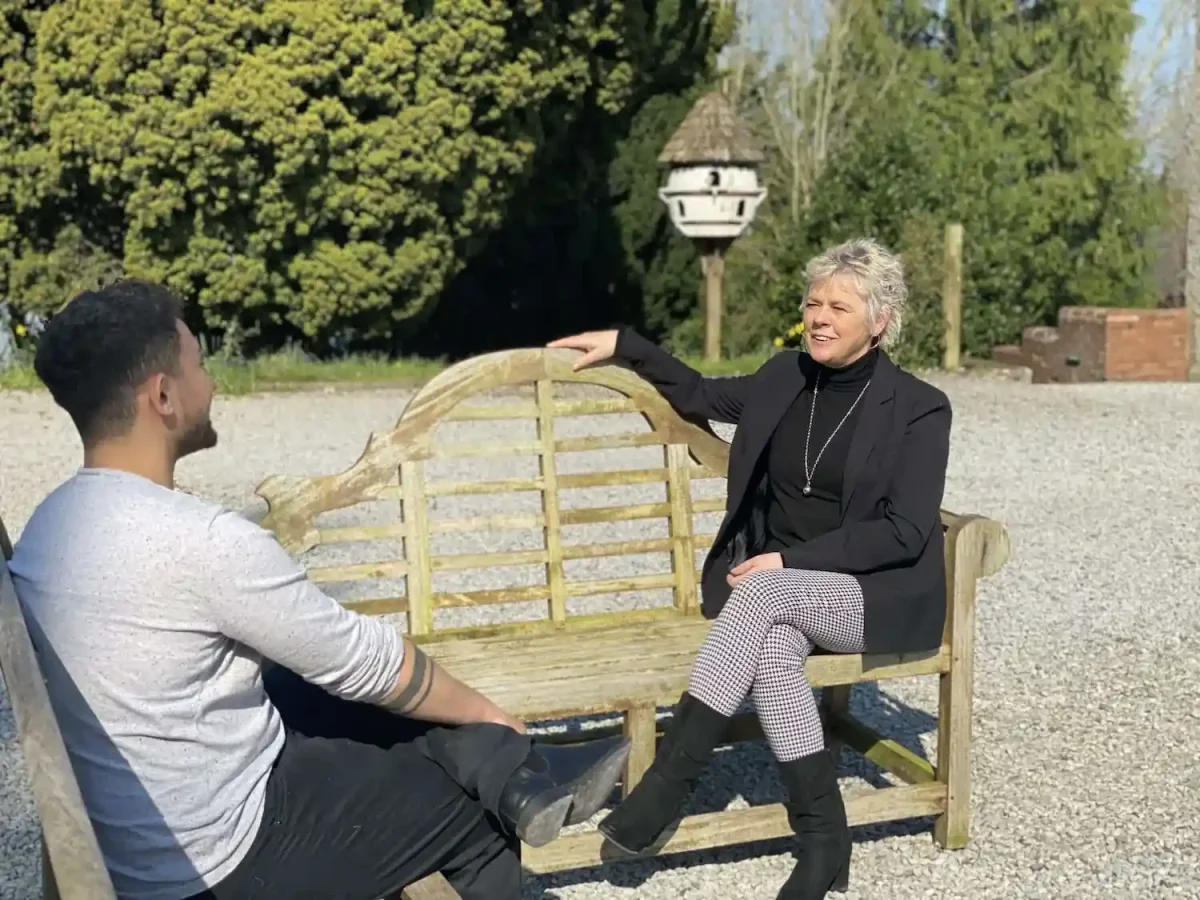Addiction can happen to all of us, regardless of gender, class, skin colour or creed. Despite this seeming universality, recovery doesn’t look the same for everyone.
Biological, social, and cultural differences mean that women face a unique set of challenges when overcoming addiction. Their bodies react differently to both the consumption and withdrawal from alcohol and drugs. Cultural narratives around addiction make it harder for women to come forward and ask for help. They are also more likely to be juggling co-occurring mental health issues alongside their substance misuse problems.
Understanding the specific requirements and experiences of women facing addiction issues is essential to their recovery. Women need treatment that takes into account these challenges, addressing coexisting mental health issues, providing judgment-free women-only group sessions, and adapting treatment plans to women’s lifestyles.

Download our Brochure
Why Women Facing Addiction Are Often Overlooked
Historically, men were diagnosed with Alcohol Use Disorder and drug misuse at higher rates than women, but the gap is rapidly closing. Today, young and middle-aged women face addiction at similar rates. For example, in the UK, 40% of those receiving treatment for alcohol addiction in 2022 were women.
For some addictions, women are at higher risk than men, for instance prescription drugs. This elevated risk is linked to the higher prescription rates of medications like anti-anxiety drugs for women compared to men.
Perhaps due to the erroneous cultural narrative that most people suffering from addiction are men, research in the field neglected women for decades. As researchers have turned their focus on both men and women, they revealed many gender differences in addiction, influenced by sociological, cultural, and biological factors.
The Key Gender Differences in Addiction and Recovery
Harvard Medical School outlines that the most important variations between men and women facing substance misuse issues centre around “susceptibility, recovery, and risk of relapse”, – which means that every part of the timeline from addiction to recovery can look different according to your gender or biological sex:
From Root Causes to Addiction
- Men face more peer pressure to consume drugs and alcohol. Their substance misuse often begins in this social setting.
- Women tend to lean towards self-medication with illicit substances. Substance misuse can be linked to underlying mental health issues or trauma.
- Women may transition rapidly from substance misuse to addiction, while men stabilise at lower doses.
Withdrawal Disparities
- Despite generally experiencing less intense alcohol withdrawal symptoms, women face a higher risk of substance misuse side effects like liver damage and overdose.
Relapse Patterns: Men vs. Women
- Men typically have a lower risk of relapse, enjoying longer periods of abstinence.
- Women, on the other hand, grapple with intense cravings and a higher likelihood of relapse.
- Women exhibit a greater risk of cross-addiction, for example, with activities such as gambling, sex, or shopping.

Women Get Addicted Faster, And Other Physiological Differences
To understand how men’s and women’s bodies react differently when it comes to substance misuse, we need only look at the example of alcohol consumption. As you probably know, alcohol tends to have a greater effect on women than on most men.
Women, on average, weigh less and possess lower levels of the stomach enzyme responsible for alcohol breakdown, resulting in elevated blood alcohol concentration. Plus, women tend to have more fatty tissue, which facilitates the absorption of alcohol into the bloodstream.
This means that women’s brains and organs are exposed to higher concentrations of blood alcohol for prolonged durations – increasing the risk of addiction.
Women’s hormonal fluctuations during menstrual cycles, pregnancy, breastfeeding, menopause, or fertility issues can also significantly influence their bodies’ processing of substances. For instance, estrogen and progesterone can heighten women’s sensitivity to drugs and alcohol. Hormonal changes may intensify cravings or trigger mood swings, creating additional challenges for women in recovery.
Tackling Trauma: The Root Causes of Women’s Addiction
Trauma is a prevalent factor in many addiction cases, and women often experience trauma differently than men. Research indicates that women are more likely to encounter trauma related to interpersonal relationships, such as domestic violence or sexual assault. These traumatic experiences can serve as catalysts for substance misuse, as women may turn to drugs or alcohol as a coping mechanism to numb emotional pain.
Addressing trauma in addiction recovery is essential, and a gender-sensitive approach acknowledges the unique traumas that women may have endured.

Reaching Out
Juggling Dual Diagnosis: Mental Health and Addiction
Women with substance use disorders often grapple with co-occurring mental health issues, a scenario known as dual diagnosis. Conditions like depression, anxiety, and eating disorders are more common in women with addiction, and these disorders can exacerbate one another. Treating both the addiction and underlying mental health issues simultaneously is crucial for a holistic and effective recovery.
Integrating mental health services into addiction treatment programs and promoting the destigmatisation of mental health challenges are vital steps towards ensuring women receive comprehensive care for dual diagnosis.
Standing up to Stigma: Social Barriers to Women’s Recovery
In our society, the stigma around substance misuse issues is an unfortunate reality which most people fighting addiction will face. This stigma is even worse for women. They may struggle to reach out and ask for help, as girls are taught from a young age that they should be looking after others, not taking care of themselves.
These unrealistic expectations are even worse for mothers, who often fear they will be judged for being “bad parents”. The risk of losing custody of their children acts as a significant deterrent to seeking treatment, and the realities of childcare can make some treatment options hard to access.
Other practical considerations can stand in the way of women seeking treatment. Statistically, women earn less than men. Treatment programmes can be costly or necessitate time out from work that many women are not able to afford.
In addressing addiction among women, dismantling these barriers is essential. We need to create an environment where seeking help is not only accepted but encouraged for everyone.
What Kind of Addiction Recovery Treatment Is Most Effective for Women?
Addiction recovery isn’t easy. For women who face more intense cravings, harsher social judgment, and more intense barriers when it comes to seeking treatment, it is even harder.
Luckily, the right treatment exists to make it easier for women to recover from substance misuse issues and reclaim their lives. Here are some of the key components of addiction recovery treatment tailored for women.

Women’s Only Support Groups
Support groups reserved for women provide a safe space for women to share their experiences, confront shared challenges, and foster genuine connections with others facing similar struggles. Women often feel more at ease discussing traumatic experiences and gender-based discrimination with other women and can benefit immensely from women-only group sessions.
Trauma-Informed Professionals
Recognising the impact of trauma on women facing addiction is essential. Psychological and medical professionals working with women in recovery should have a deep understanding of the links between trauma and addiction. They should be sensitive to the risk of re-traumatising patients and capable of addressing the root causes of addiction.


Addressing Co-Occurring Mental Health Issues
Efficient recovery programs for women must tackle co-occurring mental health issues head-on. Addiction and other mental health issues can make each other worse. Sometimes, they turn into a vicious cycle where each one feeds the other. Addiction treatments for women should provide comprehensive support and simultaneously tackle addiction and co-occurring issues.
Programmes Suitable for Mothers
Recovery programs need to be flexible and accommodating to support mothers in maintaining their parental responsibilities while undergoing treatment. Offering parenting support, and childcare services, and involving family members in the recovery process can be crucial elements in allowing women with children to access the help they need.


Tackling Shame and Guilt
Addressing internalised shame and guilt is a crucial aspect of women’s recovery. Women often bear a greater burden of stigma compared to men, making it essential to create an environment where these feelings can be openly discussed.
Addressing Physiological Challenges
Women face more intense cravings during their withdrawal than men, which can lead to relapse. Professionals should be aware of this physiological difference between men and women and provide support and advice for women facing these cravings.

How Smarmore Can Help
Treatment programmes that take into account the unique challenges faced by women in addiction recovery are key to helping them overcome substance misuse and have a smooth and effective recovery.
Women face additional challenges in substance addiction recovery that have long been overlooked. Anatomical differences in hormones, body size and composition mean that women get addicted more rapidly than men, while heightened social stigma makes it harder for them to ask for help.
Add to that financial inequality and an unequal burden of childcare and domestic labour, and you’ll understand why many treatment programmes aren’t capable of addressing women’s specific requirements.
Here at Smarmore Castle, we are determined not to leave anyone behind. We offer treatment programmes designed for women, with women-only support groups, flexible timings and all the support you need to get better.
Thousands of People Have Achieved Sobriety Through Smarmore…Join Them Today!
If you would like to know more about our programmes or book a free consultation, get in touch today!



